Related Research Articles
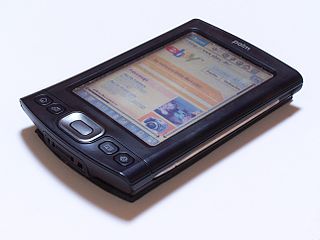
A personal digital assistant (PDA) is a multi-purpose mobile device which functions as a personal information manager. By 2007, PDAs have been mostly displaced by the widespread adoption of more highly capable smartphones, in particular those based on iOS and Android, and thus saw a rapid decline afterwards.

A Pocket PC is a class of personal digital assistant (PDA) that runs the Windows Mobile or Windows Embedded Compact operating system that has some of the abilities of modern desktop PCs. The name was introduced by Microsoft in 2000 as a rebranding of the Palm-size PC category. Some of these devices also had integrated phone and data capabilities, which were called Pocket PC Phone Edition. Windows "Smartphone" is another Windows CE based platform for non-touch flip phones or dumber phones.

Palm, Inc., was an American company that specialized in manufacturing personal digital assistants (PDAs) and developing software. Palm designed the PalmPilot, the first PDA successfully marketed worldwide, and was known for the Treo 600, one of the earlier successful smartphones. Palm developed the Palm OS software for PDAs and smartphones released under its line of Palm-branded devices and also licensed to other PDA manufacturers.

Palm is a now discontinued line of personal digital assistants (PDAs) and mobile phones developed by California-based Palm, Inc., originally called Palm Computing, Inc. Palm devices are often remembered as "the first wildly popular handheld computers," responsible for ushering in the smartphone era.
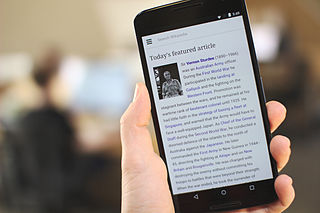
A smartphone, often simply called a phone, is a mobile device that combines the functionality of a traditional mobile phone with advanced computing capabilities. It typically has a touchscreen interface, allowing users to access a wide range of applications and services, such as web browsing, email, and social media, as well as multimedia playback and streaming. Smartphones have built-in cameras, GPS navigation, and support for various communication methods, including voice calls, text messaging, and internet-based messaging apps.
Windows Embedded Compact, formerly Windows Embedded CE, Windows Powered and Windows CE, is a discontinued operating system developed by Microsoft for mobile and embedded devices. It was part of the Windows Embedded family and served as the foundation of several classes of devices including the Handheld PC, Pocket PC, Auto PC, Windows Mobile, Windows Phone 7 and others.
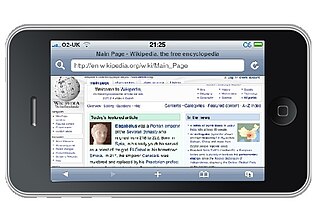
A mobile browser is a web browser designed for use on a mobile device such as a mobile phone, PDA, smartphone, or tablet. Mobile browsers are optimized to display web content most effectively on small screens on portable devices. Some mobile browsers, especially older versions, are designed to be small and efficient to accommodate the low memory capacity and low bandwidth of certain wireless handheld devices. Traditional smaller feature phones use stripped-down mobile web browsers; however, most current smartphones have full-fledged browsers that can handle the latest web technologies, such as CSS 3, JavaScript, and Ajax.

Mobile computing is human–computer interaction in which a computer is expected to be transported during normal usage and allow for transmission of data, which can include voice and video transmissions. Mobile computing involves mobile communication, mobile hardware, and mobile software. Communication issues include ad hoc networks and infrastructure networks as well as communication properties, protocols, data formats, and concrete technologies. Hardware includes mobile devices or device components. Mobile software deals with the characteristics and requirements of mobile applications.

A mobile device or handheld computer is a computer small enough to hold and operate in the hand. Mobile devices are typically battery-powered and possess a flat-panel display and one or more built-in input devices, such as a touchscreen or keypad. Modern mobile devices often emphasize wireless networking, to both the Internet and to other devices in their vicinity, such as headsets or in-car entertainment systems, via Wi-Fi, Bluetooth, cellular networks, or near-field communication.
Windows Mobile was a mobile operating system developed by Microsoft for smartphones and personal digital assistants.
Mobipocket SA was a French company incorporated in March 2000 that created the .mobi e-book file format and produced the Mobipocket Reader software for mobile phones, personal digital assistants (PDA) and desktop operating systems.
The following is a comparison of e-book formats used to create and publish e-books.

The HTC Titan is a Windows Mobile 6.1 Pocket PC PDA and phone manufactured by High Tech Computer Corporation of Taiwan. It is the successor to the HTC Apache upon which it improves by adding more ROM, GPS, EVDO Rev. A, additional hard keys, a scroll-wheel, spring-loaded keyboard, and a higher resolution camera. The Windows Mobile 6.1 operating system includes Office Mobile along with HTML email through Microsoft Outlook Mobile. Windows Media Player is included, allowing the Titan to act as a digital audio and digital movie player.
A mobile operating system is an operating system used for smartphones, tablets, smartwatches, smartglasses, or other non-laptop personal mobile computing devices. While computers such as typical/mobile laptops are "mobile", the operating systems used on them are generally not considered mobile, as they were originally designed for desktop computers that historically did not have or need specific mobile features. This line distinguishing mobile and other forms has become blurred in recent years, due to the fact that newer devices have become smaller and more mobile unlike hardware of the past. Key notabilities blurring this line are the introduction of tablet computers, light laptops, and the hybridization of the two in 2-in-1 PCs.
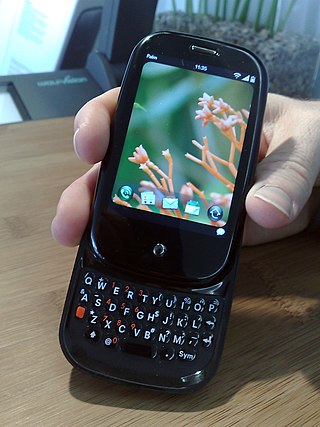
The Palm Pre, styled as palm prē, is a multitasking smartphone that was designed and marketed by Palm with a multi-touch screen and a sliding keyboard. The smartphone was the first to use Palm's Linux-based mobile operating system, webOS. The Pre functions as a camera phone and a portable media player, and has location and navigation capabilities. The Pre also serves as a personal information manager, has a number of communication and collaboration applications, and has Bluetooth and Wi-Fi connectivity built-in.
Novarra was a mobile internet software company founded in 2000 and based in Itasca, Illinois, United States. It created web-based services such as web internet access, portals, videos, widgets and advertising for mobile devices. Novarra provided access to the internet and other services through wireless handsets, PDAs and laptops and sold directly to operators, mobile handset manufacturers and internet brand companies. In 2010, Nokia acquired 100% of Novarra's shares.
An app store, also called an app marketplace or app catalog, is a type of digital distribution platform for computer software called applications, often in a mobile context. Apps provide a specific set of functions which, by definition, do not include the running of the computer itself. Complex software designed for use on a personal computer, for example, may have a related app designed for use on a mobile device. Today apps are normally designed to run on a specific operating system—such as the contemporary iOS, macOS, Windows, Linux or Android—but in the past mobile carriers had their own portals for apps and related media content.
Skweezer, formally known as a mobile browser. It reformatted and compressed web content in order to reduce a web page's file size and make the downloaded content easier to view on a small screen. It was developed by Skweezer, Inc. and initially released in 2003. Skweezer's technology is used to mobilize Web content service by search engines, Web portals, and wireless carriers such as IAC/InterActiveCorp, Bloglines, and Orange SA. Skweezer was available in English, French, German, Italian, Portuguese, Spanish, and Japanese languages and serves customers in over 175 countries worldwide.
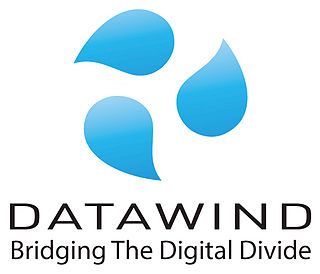
Jeotex Inc. was a British-Canadian-Indian company that developed and manufactured low-cost tablet computers and smartphones. Founded in Montreal, Quebec, the company aimed to produce tablets primarily for markets in India, Nigeria, the United Kingdom, Canada, and the United States. Jeotex created the Aakash tablet computer, which was called the "world's cheapest tablet" as it was priced at US$37.99 per unit in 2012. The Aakash was developed for India's Ministry for Human Resource Development (MHRD).
References
- ↑ "Case Study The Problem: Handmark had 50% of the market for software for PDAs. Unfortunately, fewer people are buying PDAs".
- ↑ "Corporate Profile for Mobile Generation". Business Wire. August 11, 2000.
- ↑ Brown, M. Steele (February 4, 2001). "Palm Potential".
- ↑ "Handmark Announces New Applications for Windows Mobile-based Smartphones". Archived from the original on 2003-12-08.
- ↑ "An Express Route to Multiplatform Success" (PDF). Archived from the original (PDF) on 2006-09-20.
- ↑ www.cleveland.com https://web.archive.org/web/20070311070017/http://www.cleveland.com/business/plaindealer/index.ssf?%2Fbase%2Fbusiness%2F115433484687080.xml&coll=2. Archived from the original on 2007-03-11.
{{cite web}}: Missing or empty|title=(help) - ↑ "PalmSource | Press Room". Archived from the original on 2006-10-16. Retrieved 2006-09-25.
- ↑ Keith Andrew (29 January 2010). "Handmark sheds Astraware as company shifts away from games". pocketgamer.biz. Retrieved 2020-05-28.
- ↑ "Handmark Acquires FreeRange Communications to Expand Mobile Media Offerings". Handmark. 2009-02-05. Archived from the original on 2012-03-18. Retrieved 2013-04-25.
- ↑ "The Only Complete Mobile App Solution for Media and Content Publishers". Handmark. Archived from the original on 2013-06-02. Retrieved 2013-04-25.
- ↑ "Top 5 Learnings from Running a Mobile App "Startup"". Mobile Portland. 2012-09-21.
- ↑ Deans, Jason (2010-04-24). "London Evening Standard launches smartphone app". The Guardian. Retrieved 2018-10-11.
- ↑ "Timeline shows long engagement led up to Sprint-Handmark union". Kansas City Business Journal. 2013-05-20.